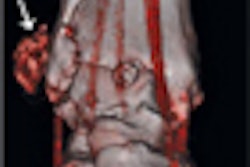This week's U.S. Food and Drug Administration (FDA) hearings on radiation safety are exposing virtual colonoscopy to high doses of criticism.
The two-day meeting in Bethesda, MD, is aimed at finding ways to reduce radiation exposure from medical scanning. But much of the mainstream media's coverage is focusing on allegations by a former FDA staffer who claims that the agency hushed up his concerns over radiation dose from VC (also known as CT colonography or CTC).
In an article in the New York Times, gastroenterologist and former FDA medical device reviewer Dr. Julian Nicholas said the agency suppressed his opposition to the use of virtual colonoscopy for colon cancer screening. Nicholas now practices at Scripps Clinic in San Diego.
He testified that he repeatedly rejected a manufacturer's request for 510(k) clearance of an unnamed CT product designed specifically for colon screening -- unless it came with a warning label, according to the Times article.
"I hope you understand that the failure to include a warning on the label will mean that patients will undoubtedly develop abdominal cancer and leukemia," Nicholas wrote in a June letter to the FDA. "It may not happen tomorrow, but yes, sadly it will happen."
Nicholas said he was ridiculed by agency managers for "raising the bugaboo of radiation," and was subjected to retaliation, according to the Times.
FDA spokesman Dick Thompson said in a statement that he looked into Nicholas' claims but took no further action, emphasizing that "it is not uncommon" for scientists at the agency to have opposing viewpoints, and that in any case there was no penalty associated with expressing them.
Supporters of CT colonography emphasize that the exam uses low levels of radiation, usually 2-3 mSv per exam, that aren't dangerous for patients ages 50 and older who need colon screening.
"When we look at virtual colonoscopy, the benefits of detecting polyps far outweigh the theoretical risk the low amounts of radiation would have on people of that age," stated Dr. Michael Macari from New York University in the article.
Related Reading
Radiology gears up for FDA radiation hearings, March 30, 2010
Obama gets virtual colonoscopy, keeps presidential powers, March 1, 2010
Medical groups tell Congress more radiation rules are needed, March 1, 2010
Congress surprised at lack of medical radiation oversight, February 26, 2010
FDA launches initiative to rein in medical radiation, February 9, 2010
Copyright © 2010 AuntMinnie.com




















